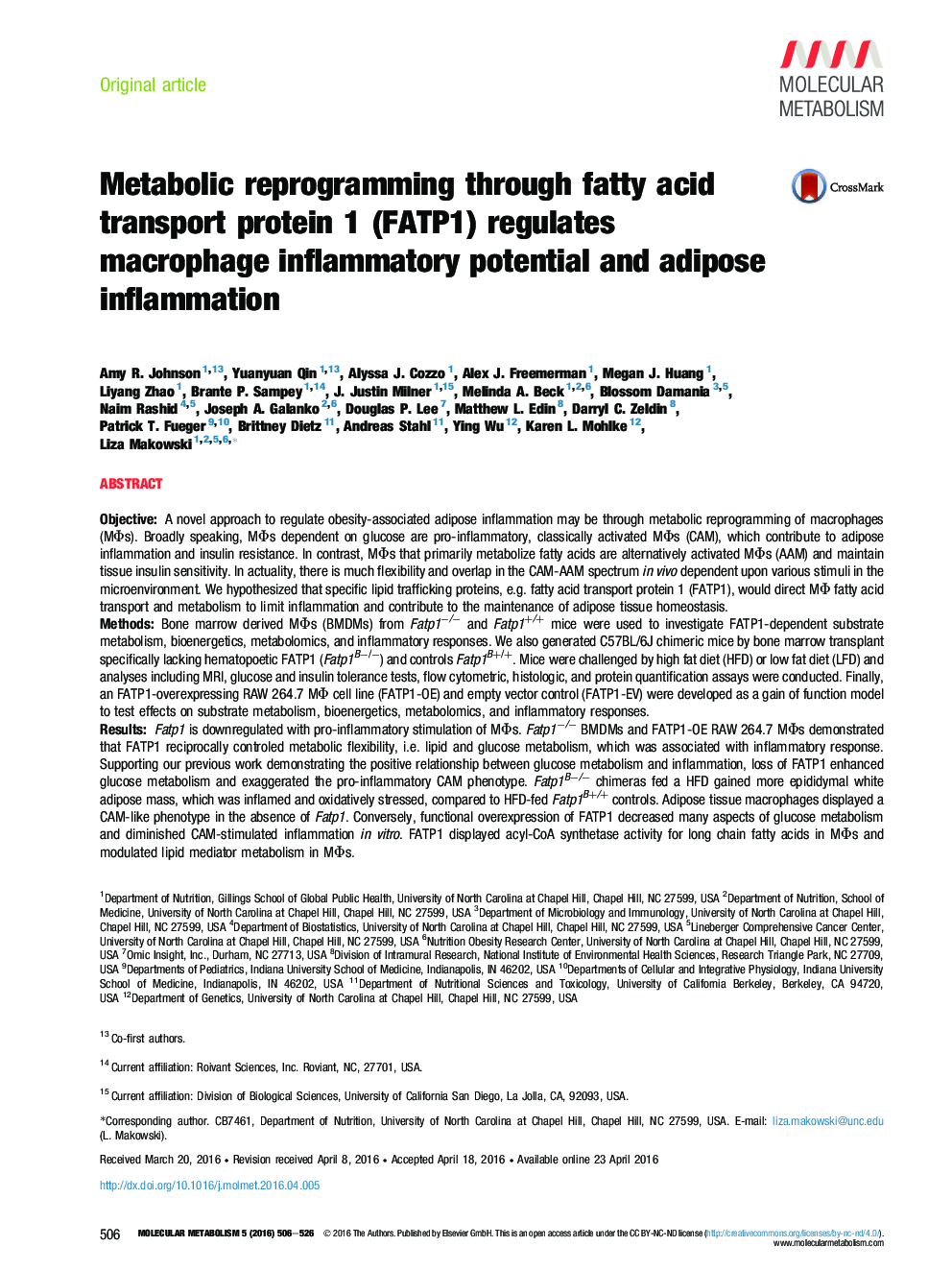| کد مقاله | کد نشریه | سال انتشار | مقاله انگلیسی | نسخه تمام متن |
|---|---|---|---|---|
| 3001260 | 1180561 | 2016 | 21 صفحه PDF | دانلود رایگان |
• FATP1-mediated activation of fatty acids is a novel approach to limit inflammation.
• Fatp1 deficiency primed macrophages for pro-inflammatory activation.
• Lack of Fatp1 led to greater HFD-induced adipose inflammation.
• Fatp1−/− adipose tissue macrophages were classically activated.
ObjectiveA novel approach to regulate obesity-associated adipose inflammation may be through metabolic reprogramming of macrophages (MΦs). Broadly speaking, MΦs dependent on glucose are pro-inflammatory, classically activated MΦs (CAM), which contribute to adipose inflammation and insulin resistance. In contrast, MΦs that primarily metabolize fatty acids are alternatively activated MΦs (AAM) and maintain tissue insulin sensitivity. In actuality, there is much flexibility and overlap in the CAM-AAM spectrum in vivo dependent upon various stimuli in the microenvironment. We hypothesized that specific lipid trafficking proteins, e.g. fatty acid transport protein 1 (FATP1), would direct MΦ fatty acid transport and metabolism to limit inflammation and contribute to the maintenance of adipose tissue homeostasis.MethodsBone marrow derived MΦs (BMDMs) from Fatp1−/− and Fatp1+/+ mice were used to investigate FATP1-dependent substrate metabolism, bioenergetics, metabolomics, and inflammatory responses. We also generated C57BL/6J chimeric mice by bone marrow transplant specifically lacking hematopoetic FATP1 (Fatp1B−/−) and controls Fatp1B+/+. Mice were challenged by high fat diet (HFD) or low fat diet (LFD) and analyses including MRI, glucose and insulin tolerance tests, flow cytometric, histologic, and protein quantification assays were conducted. Finally, an FATP1-overexpressing RAW 264.7 MΦ cell line (FATP1-OE) and empty vector control (FATP1-EV) were developed as a gain of function model to test effects on substrate metabolism, bioenergetics, metabolomics, and inflammatory responses.ResultsFatp1 is downregulated with pro-inflammatory stimulation of MΦs. Fatp1−/− BMDMs and FATP1-OE RAW 264.7 MΦs demonstrated that FATP1 reciprocally controled metabolic flexibility, i.e. lipid and glucose metabolism, which was associated with inflammatory response. Supporting our previous work demonstrating the positive relationship between glucose metabolism and inflammation, loss of FATP1 enhanced glucose metabolism and exaggerated the pro-inflammatory CAM phenotype. Fatp1B−/− chimeras fed a HFD gained more epididymal white adipose mass, which was inflamed and oxidatively stressed, compared to HFD-fed Fatp1B+/+ controls. Adipose tissue macrophages displayed a CAM-like phenotype in the absence of Fatp1. Conversely, functional overexpression of FATP1 decreased many aspects of glucose metabolism and diminished CAM-stimulated inflammation in vitro. FATP1 displayed acyl-CoA synthetase activity for long chain fatty acids in MΦs and modulated lipid mediator metabolism in MΦs.ConclusionOur findings provide evidence that FATP1 is a novel regulator of MΦ activation through control of substrate metabolism. Absence of FATP1 exacerbated pro-inflammatory activation in vitro and increased local and systemic components of the metabolic syndrome in HFD-fed Fatp1B−/− mice. In contrast, gain of FATP1 activity in MΦs suggested that Fatp1-mediated activation of fatty acids, substrate switch to glucose, oxidative stress, and lipid mediator synthesis are potential mechanisms. We demonstrate for the first time that FATP1 provides a unique mechanism by which the inflammatory tone of adipose and systemic metabolism may be regulated.
Figure optionsDownload as PowerPoint slide
Journal: Molecular Metabolism - Volume 5, Issue 7, July 2016, Pages 506–526
